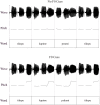Experience with a second language affects the use of fundamental frequency in speech segmentation
- PMID: 28738093
- PMCID: PMC5524284
- DOI: 10.1371/journal.pone.0181709
Experience with a second language affects the use of fundamental frequency in speech segmentation
Abstract
This study investigates whether listeners' experience with a second language learned later in life affects their use of fundamental frequency (F0) as a cue to word boundaries in the segmentation of an artificial language (AL), particularly when the cues to word boundaries conflict between the first language (L1) and second language (L2). F0 signals phrase-final (and thus word-final) boundaries in French but word-initial boundaries in English. Participants were functionally monolingual French listeners, functionally monolingual English listeners, bilingual L1-English L2-French listeners, and bilingual L1-French L2-English listeners. They completed the AL-segmentation task with F0 signaling word-final boundaries or without prosodic cues to word boundaries (monolingual groups only). After listening to the AL, participants completed a forced-choice word-identification task in which the foils were either non-words or part-words. The results show that the monolingual French listeners, but not the monolingual English listeners, performed better in the presence of F0 cues than in the absence of such cues. Moreover, bilingual status modulated listeners' use of F0 cues to word-final boundaries, with bilingual French listeners performing less accurately than monolingual French listeners on both word types but with bilingual English listeners performing more accurately than monolingual English listeners on non-words. These findings not only confirm that speech segmentation is modulated by the L1, but also newly demonstrate that listeners' experience with the L2 (French or English) affects their use of F0 cues in speech segmentation. This suggests that listeners' use of prosodic cues to word boundaries is adaptive and non-selective, and can change as a function of language experience.
Conflict of interest statement
Figures



Similar articles
-
Effects of the Native Language on the Learning of Fundamental Frequency in Second-Language Speech Segmentation.Front Psychol. 2016 Jun 29;7:985. doi: 10.3389/fpsyg.2016.00985. eCollection 2016. Front Psychol. 2016. PMID: 27445943 Free PMC article.
-
Talker-listener accent interactions in speech-in-noise recognition: effects of prosodic manipulation as a function of language experience.J Acoust Soc Am. 2010 Sep;128(3):1357-65. doi: 10.1121/1.3466857. J Acoust Soc Am. 2010. PMID: 20815470
-
Perception of English vowels by bilingual Chinese-English and corresponding monolingual listeners.Lang Speech. 2014 Jun;57(Pt 2):215-37. doi: 10.1177/0023830913502774. Lang Speech. 2014. PMID: 25102607
-
The language- specific interdependence of tonal and durational cues in perceived rhythmicality.Phonetica. 2011;68(1-2):1-25. doi: 10.1159/000327223. Epub 2011 Jul 21. Phonetica. 2011. PMID: 21804331 Review.
-
Narrowing the distance to language: one step at a time.J Commun Disord. 1999 Jul-Aug;32(4):207-22. doi: 10.1016/s0021-9924(99)00014-3. J Commun Disord. 1999. PMID: 10466094 Review.
Cited by
-
Spoken Word Segmentation in First and Second Language: When ERP and Behavioral Measures Diverge.Front Psychol. 2021 Sep 17;12:705668. doi: 10.3389/fpsyg.2021.705668. eCollection 2021. Front Psychol. 2021. PMID: 34603133 Free PMC article.
-
Bilinguals' speech perception in noise: Perceptual and neural associations.PLoS One. 2022 Feb 23;17(2):e0264282. doi: 10.1371/journal.pone.0264282. eCollection 2022. PLoS One. 2022. PMID: 35196339 Free PMC article.
References
-
- Bagou O, Fougeron C, Frauenfelder UH. Contribution of prosody to the segmentation and storage of "words" in the acquisition of a new mini-language. In: Bel B, Marlien I, editors. Proceedings of the Speech Prosody 2002 conference. Aix-en-Provence: Laboratoire Parole et Langage; 2002. p. 159–62.
-
- Cunillera T, Toro JM, Sebastian-Galles N, Rodriguez-Fornells A. The effects of stress and statistical cues on continuous speech segmentation: an event-related brain potential study. Brain Res. 2006;1123(1):168–78. doi: 10.1016/j.brainres.2006.09.046 . - DOI - PubMed
-
- Finn AS, Hudson Kam CL. The curse of knowledge: first language knowledge impairs adult learners' use of novel statistics for word segmentation. Cognition. 2008;108(2):477–99. doi: 10.1016/j.cognition.2008.04.002 . - DOI - PubMed
-
- Kim S, Broersma M, Cho T. The use of prosodic cues in learning new words in an unfamiliar language. Studies in Second Language Acquisition. 2012;34:415–44.
-
- Ordin M, Nespor M. Transition Probabilities and Different Levels of Prominence in Segmentation. Language Learning. 2013;63(4):800–34. 1504415892; 201402884.
MeSH terms
LinkOut - more resources
Full Text Sources
Other Literature Sources

